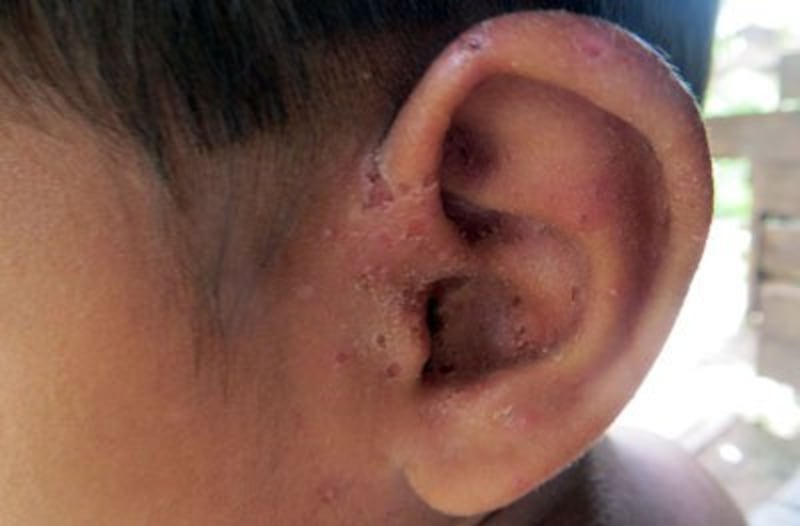Indigenous villagers in northeastern Cambodia’s Stung Treng province on Monday called for an investigation into a saw mill they say has polluted their local waterway and caused residents to contract a skin disease.
The ethnic Kuy villagers from Thala Barivat district told RFA’s Khmer Service that the Ou Svay stream they use to cook, bathe and water their crops is contaminated, and urged the Ministry of Health and local nongovernmental organizations to help them resolve the situation.
Around 3,000 people from 900 families live in the district and, according to villager Noun Rim, some 30 percent of area children and 20 percent of adults are now suffering from an itchy rash that covers their entire body.
She said symptoms of the disease began to appear shortly after the mill, which went into operation earlier this year, dumped waste from a resin used to coat wood for furniture into the stream.
“It is itchy when I take bath, but I have no choice other than to bathe in the stream,” she said, adding that ethnic Kuy traditionally use local waterways for daily needs instead of building reservoirs to store water at their homes.
“Our ancestors have always used the stream [without any problems].”
Another villager named Chan Sok said that ever since the mill was established, the water of the Ou Svay has smelled bad and wildlife in the stream—including fish, crabs and snails—has died off.
“The water is contaminated,” he said.
“There are no more fish, so we can’t fish anymore.”
A third villager, who spoke on condition of anonymity, said her 13 year-old-daughter had developed a skin disease that caused a rash to appear after frequently swimming at the stream.
“There are red dots like mosquito bites on her body, and it is very itchy,” she said.
RFA was unable reach saw mill owner Moeung Ratha for a response to the allegations.
Call for resolution

Nheang Phon, the chief of Thala Barivat’s Sam Ang village, told RFA that local authorities had not received any reports about an outbreak of skin disease, but said residents had filed a complaint about the saw mill causing water contamination in the past.
“So far, we have received one complaint about the saw mill,” he said.
“I ordered the mill to dig a pond to hold the waste or to burn it.”
It was unclear whether the mill had complied with the order.
Hou Sam Ol, provincial coordinator for local rights group Adhoc, told RFA that after conducting a preliminary investigation, he was convinced that water contamination was responsible for the skin disease affecting the residents of Thala Barivat.
He urged the provincial health department to investigate the case, warning that more people were likely to contract the disease if nothing is done.
The Adhoc official added that if authorities do not act to resolve the problem, it would also worsen poverty in the region.
“Indigenous Kuy villagers are already poor,” he said.
“If they are sick, they will have to spend more money to treat the disease.”
Illegal timber trade
Complaints of water contamination in Thala Barivat follow a call in June by indigenous villagers in Stung Treng’s Sesan district for local forestry officials to crackdown on illegal saw mills and to provide them with protection after they received death threats from unsanctioned loggers of luxury timber.
The villagers said they had received threats from the loggers after they warned authorities that three illegal mills in the area would destroy the local forest and its resources if they weren’t shut down.
Local authorities refused to raid the mills, however, prompting the group to sign a petition calling for action.
Adhoc told RFA at the time that the money to be made through illegal saw mills was driving the practice of illicit logging in the region.
In March last year, the United Nations children’s agency UNICEF said that nearly half the population of Cambodia does not have access to safe water and basic sanitation, and called on the authorities to give greater attention to improving rural water supply in the impoverished country.
Some 6.3 million out of 14.9 million Cambodians are unable to access clean drinking water, most of them poor and living in rural areas, it said.
According to UNICEF, improving the quality of rural water would help accelerate Cambodia’s social and economic development, and the agency urged authorities to make greater commitments and investments to tackling the issue.
Reported by Men Sothy for RFA’s Khmer Service. Translated by Samean Yun. Written in English by Joshua Lipes.
